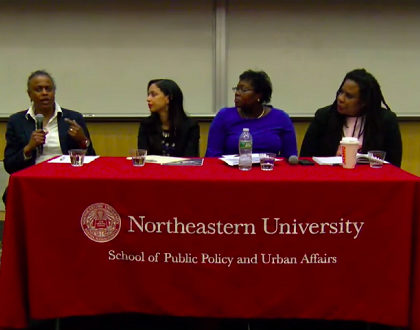Putting your Money Where your Mouth is — Economic Equity

How do we redress racial and social inequality?
Our President and CEO, Beth Chandler, recently joined a panel as part of a collaboration between YW Boston and Northeastern University’s Dukakis Center for the Myra Kraft Open Classroom course titled Putting your Money Where
Panelists included:
Beth Chandler, President & CEO – YW Boston
Kathryn Henderson, Assistant Vice President – YW Boston
Nia Evans, Executive Director – Boston’s Ujima Project
Celina Barrios-Millner, Director of Equity and Inclusion – Mayor’s Office of Economic Development, City of Boston
Daylana Ervin-Parker, Director of Budget and Supplier Diversity – Blue Cross Blue Shield of Massachusetts
Here are our top three takeaways from Putting your Money Where your Mouth is — Economic Equity:
1. Multi-prong approaches are essential to incremental change
“There have been many reports detailing ‘the great economic divide’ particularly here in Boston,” Beth Chandler explained, “One of the big ones reported white Bostonians as having a wealth of $247,000 and U.S. born blacks having a wealth of $8.” Beth then turns to the panelists to ask them whether they feel there is a sense of urgency in Boston towards addressing this inequality, and if there isn’t, what are some ways to create it and sustain it? Celina Barrios-Millner, Director of Equity and Inclusion at the Mayor’s Office of Economic Development, feels like there is, in fact, the urgency within the City to address inequity. Celina goes on to mention some initiatives aimed at tackling different angles rather than working in silos through partnerships, co-ops, and various offices such as the City of Boston Office of Diversity, the Office of Economic Development, and the Office of Women’s Advancement. Daylana Ervin-Parker, Director of Budget and Supplier Diversity at Blue Cross Blue Shield of Massachusetts, also feels like there is a sense of urgency but notes that there is still more that could be done, particularly in the private sector. Nia Evans, Executive Director at Boston’s Ujima Project, follows up by pointing out that sense of urgency is often not shared, and that some people are still not able to take part in the conversation.
2. The focus should go beyond the interpersonal level
Considering that the wealth gap has not significantly decreased in several years, Beth Chandler asked the panelists what was getting in the way of urgency and progress. Celina Barrios-Millner pointed out how, many times, efforts start on the interpersonal level with anti-bias training and the like, but avoid tackling systemic and institutionalized racism. Daylana
2. Competing notions of the problem lead to competing notions on how to address it
Nia Evans underlined the importance of changing the narrative. Nia mentioned the importance of delving deeper into the history of slavery, redlining, and inequity to address gaps in understanding. Nia then went on to point out how notions of individual responsibility still exist and that is why some are addressing an institutional problem individually— budgeting workshops are not going to solve economic inequities for blacks and minorities, particularly when wealth is a legacy that is
Watch the full session of Putting your Money Where your Mouth is — Economic Equity below.
About YW Boston
As the first YWCA in the nation, YW Boston has been at the forefront of advancing equity for over 150 years. Through our three programs—Dialogues, LeadBoston, and InIt—as well as our advocacy work, we help individuals and organizations create more inclusive environments where women, people of color, and especially women of color can succeed.
